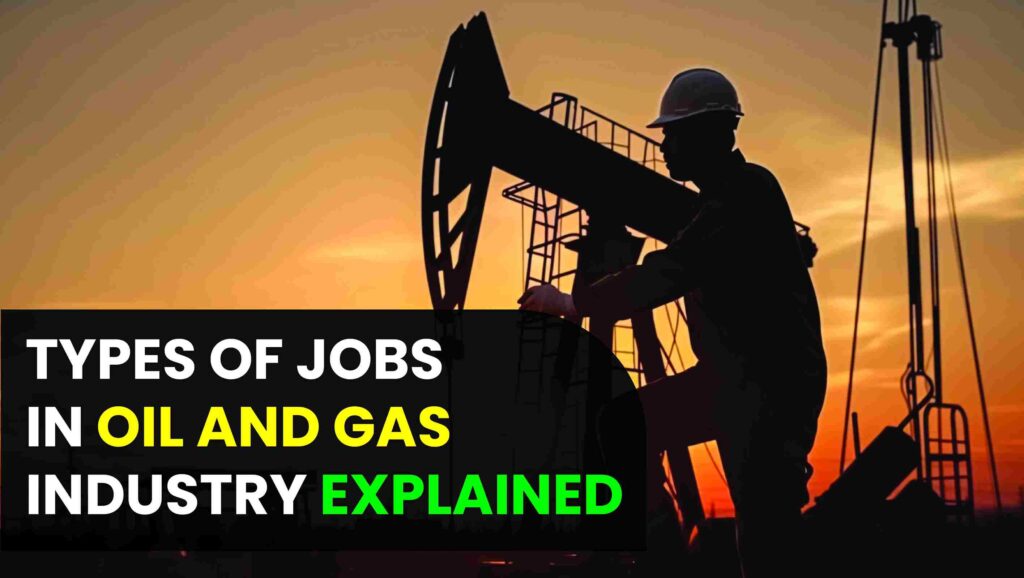The oil and gas industry is a vast and dynamic field, offering a variety of career paths for those interested in energy and natural resources. Whether you’re a fresh graduate or a professional looking to transition into this sector, understanding the different jobs in the oil and gas industry can help you navigate your career journey. Let’s dive into the exciting world of oil and gas jobs!
Overview of the Oil and Gas Industry
The oil and gas sector plays a crucial role in the global energy supply, providing jobs for millions of people worldwide. In fact, according to recent statistics, the industry employs over 10 million individuals in various capacities. Understanding the job roles within this sector is essential for anyone looking to build a career in energy.
Key Statistics
- Employment Rates: The oil and gas industry is one of the largest employers in the world, with a significant number of oil and gas industry job opportunities available.
Global Energy Supply: This sector is vital for meeting the world’s energy needs, making it a stable career choice.
Types of Jobs in Oil and Gas
The oil and gas industry offers a wide range of job roles, each with its own responsibilities and qualifications. Here are some of the most common positions:
1. Drilling Engineer
- Responsibilities: Overseeing drilling operations and designing drilling programs. Drilling engineers work closely with geologists and other engineers to ensure that drilling is done safely and efficiently.
- Qualifications: An engineering degree and experience with drilling technologies. Many drilling engineers also pursue certifications to enhance their expertise.
2. Energy Engineer
- Responsibilities: Designing sustainable energy systems and improving energy efficiency. Energy engineers focus on reducing energy consumption and developing renewable energy solutions.
- Qualifications: An engineering degree with knowledge of renewable energy sources. Familiarity with energy management systems is also beneficial.
3. Geologist/Geoscientist
- Responsibilities: Analyzing geological data to locate potential drilling sites. Geologists play a critical role in identifying where to drill for oil and gas.
- Qualifications: A degree in geology or earth sciences, along with strong analytical skills. Many geologists also use advanced software for data analysis.
4. Petroleum Engineer
- Responsibilities: Optimizing extraction processes and managing reservoirs. Petroleum engineers work to improve the efficiency of oil and gas extraction.
- Qualifications: A degree in petroleum engineering and strong problem-solving skills. Experience with reservoir simulation software is often required.
5. Safety Officer
- Responsibilities: Ensuring compliance with safety regulations and training staff on safety protocols. Safety officers are essential for maintaining a safe working environment in the oil and gas industry.
- Qualifications: A background in safety management or engineering, along with relevant certifications. Knowledge of OSHA regulations is often required.
6. NDT Inspector
- Responsibilities: Conducting non-destructive testing to ensure the integrity of equipment and structures. NDT inspectors play a vital role in maintaining safety and quality standards.
- Qualifications: Certification in non-destructive testing methods and relevant technical skills are required. IMECH Institute offers specialized courses such as NDT Inspection Techniques and the Certified NDT Inspector Program, which cover various non-destructive testing methods, including ultrasonic, magnetic particle, and radiographic testing, preparing you for a critical role in quality assurance and safety maintenance.
7. Welding Inspector
- Responsibilities: Inspecting welding work to ensure it meets industry standards and specifications. Welding inspectors are crucial for quality control in construction and maintenance projects.
- Qualifications: Certification in welding inspection and a strong knowledge of welding processes and standards are necessary. IMECH Institute’s Welding Inspection Certification and Advanced Welding Technologies courses provide training on welding techniques, inspection standards, and the latest advancements in welding processes, ensuring you are well-prepared to maintain high-quality standards in welding operations.
8. BGAS Grade 2 Coating/Painting Inspector
- Responsibilities: Inspecting coating and painting work to ensure compliance with industry standards and specifications. Coating inspectors play a key role in protecting infrastructure from corrosion and environmental damage.
- Qualifications: Certification in coating inspection and a thorough understanding of painting processes and standards. IMECH Institute offers the BGAS Coating Inspector course, a 20-day program that includes exhaustive theory and practical training, international certification, and instruction from highly experienced trainers, enabling you to become a certified painting inspector.
9. Civil QA/QC Inspector
- Responsibilities: Ensuring that civil engineering projects meet quality standards and regulatory requirements. QA/QC inspectors monitor construction processes, materials, and workmanship.
- Qualifications: A degree in civil engineering or a related field, along with certifications in quality assurance and control. IMECH Institute’s Civil QA/QC Course is a 30-day training program aligned with international standards for multi-discipline QC inspectors, taught by Saudi Aramco approved QC inspectors.
10. API Inspector
- Responsibilities: Conducting inspections as per API standards to ensure the quality and safety of equipment and operations in the oil and gas industry.
- Qualifications: Certification in relevant API standards (API 510, 570, 653) and experience with API guidelines. IMECH Institute provides intensive 7-day courses followed by 10 days of practice, covering the latest API guidelines and boasting an excellent pass record.
11. Mechanical QA/QC Inspector
- Responsibilities: Overseeing the quality assurance and control processes for mechanical systems and components in oil and gas projects.
- Qualifications: Technical training in mechanical systems and certifications in QA/QC practices. IMECH Institute’s Mechanical QA/QC Training is a 60-day program designed to create multi-discipline QC inspectors, featuring training as per international standards, site visits, internships, and placement opportunities through online and classroom formats.
12. Maintenance Technician
- Responsibilities: Performing routine maintenance and repairs on equipment to ensure operational efficiency and prevent downtime.
- Qualifications: Technical training in mechanical or electrical systems. IMECH Institute’s Maintenance Technician Training provides hands-on experience with equipment maintenance, troubleshooting techniques, and preventive maintenance strategies.
13. Electrical Technician
- Responsibilities: Managing electrical systems, troubleshooting issues, and ensuring the safe operation of electrical equipment.
- Qualifications: Certification in electrical technology and experience with industrial electrical systems. IMECH Institute’s Electrical Systems Certification offers comprehensive training in electrical maintenance, safety protocols, and system diagnostics.
14. Instrumentation Technician
- Responsibilities: Installing, maintaining, and repairing instruments and control systems used in oil and gas operations.
- Qualifications: Technical education in instrumentation and control systems. IMECH Institute’s Instrumentation Technician Course covers the fundamentals of instrumentation, calibration techniques, and the operation of control systems essential for this role.
15. Logistics Coordinator
- Responsibilities: Managing the transportation and storage of oil and gas products, ensuring timely delivery and efficient supply chain operations.
- Qualifications: Experience in logistics, supply chain management, or a related field. IMECH Institute’s Logistics Management Certification provides training in supply chain optimization, transportation logistics, and inventory management tailored to the oil and gas industry.
16. Project Manager
- Responsibilities: Overseeing oil and gas projects from inception to completion, ensuring they are completed on time, within budget, and meet quality standards.
- Qualifications: A degree in engineering, business, or a related field, along with project management experience. IMECH Institute’s Project Management in Oil & Gas course offers training in project planning, risk management, and leadership skills necessary for successful project execution.
Entry-Level Opportunities in the Oil and Gas Industry
For fresh graduates, the oil and gas industry offers several jobs suitable for freshers, such as field technicians and safety assistants. Gaining experience through internships or apprenticeships can significantly enhance your employability in this competitive field.
Importance of Internships
Internships provide hands-on experience and a chance to network within the industry, making them invaluable for those just starting their careers. Many companies offer internship programs that can lead to full-time positions after graduation.
Common Entry-Level Positions
- Field Technician: Assists in the operation and maintenance of equipment at drilling sites.
- Safety Assistant: Supports safety officers in implementing safety protocols and conducting training sessions.
- NDT Technician: Performs non-destructive testing under the supervision of senior inspectors.
- Welding Assistant: Aids welding inspectors in monitoring and assessing welding work.
- Maintenance Assistant: Supports maintenance technicians in routine equipment checks and repairs.
- Logistics Assistant: Assists logistics coordinators in managing transportation and storage tasks.
Skills Required for Success in Oil and Gas Jobs
To thrive in the oil and gas sector, you’ll need a mix of technical and soft skills:
Technical Skills
- Engineering Principles: Understanding the fundamentals of engineering is crucial for many roles. This includes knowledge of mechanical, electrical, and civil engineering principles.
- Geological Analysis: Skills in analyzing geological data are essential for geologists and geoscientists. Familiarity with geological mapping and data interpretation is important.
- Safety Protocols: Knowledge of safety regulations and practices is vital, especially for roles like Safety Officers and NDT Inspectors.
- Technical Proficiency: Ability to use industry-specific software and tools, such as reservoir simulation software for Petroleum Engineers or geological survey tools for Geologists.
Soft Skills
- Communication: Being able to convey complex information clearly is vital. Strong communication skills are necessary for collaborating with team members and presenting findings.
- Teamwork: Many projects require collaboration across various disciplines. Being a team player is essential for success in the oil and gas industry.
- Problem-Solving: The ability to identify issues and develop effective solutions is highly valued in all roles.
- Adaptability: The oil and gas industry is constantly evolving. Being open to learning new technologies and adapting to changing environments is crucial.
Career Pathways in the Oil and Gas Industry
The oil and gas industry offers numerous opportunities for career progression. Many professionals start in entry-level roles and can advance to specialized positions, such as environmental engineering or project management.
Potential Career Progression
- Entry-Level: Field Technician, Safety Assistant, NDT Technician, Welding Assistant, Maintenance Assistant, Logistics Assistant
- Mid-Level: Drilling Engineer, Energy Engineer, Geologist, Petroleum Engineer, Safety Officer, Electrical Technician, Instrumentation Technician, Logistics Coordinator
- Senior-Level: Project Manager, Environmental Engineer, Senior Drilling Engineer, HSE Manager, Operations Manager
Specialization Opportunities
As you gain experience, you may choose to specialize in areas such as:
- Environmental Engineering: Focusing on minimizing the environmental impact of oil and gas operations.
- Project Management: Overseeing large-scale projects and ensuring they are completed on time and within budget.
- Advanced Inspection Techniques: Specializing further in NDT or welding inspection with advanced certifications.
- Supply Chain Optimization: Enhancing the efficiency of logistics and supply chain operations within the industry.
- Renewable Energy Integration: Combining traditional oil and gas expertise with renewable energy solutions to create sustainable energy systems.
IMECH Institute: Empowering Your Oil and Gas Career
To excel in the oil and gas industry, continuous education and specialized training are essential. The IMECH Institute offers a range of courses tailored to the needs of the oil and gas sector, helping you acquire the necessary skills and certifications to advance your career. Whether you’re aiming to become a certified NDT Inspector, a Welding Inspector, or seeking to enhance your engineering expertise, IMECH Institute provides comprehensive training programs that align with industry standards and employer expectations.
Some of the key courses offered by IMECH Institute include:
- NDT – Non Destructive Testing: A 35-day course offering NDT Level 1 & 2 Training and Certification as per ASNT standards. The program features a fully equipped lab for practicals, site visits, internships, and placement opportunities, making it one of the best NDT training programs in the industry.
- Welding-Inspection 3.1 – CSWIP: A 30-day course providing exhaustive theory and practical training for becoming a Certified Welding Inspector (CSWIP 3.1). This internationally recognized certification is achieved through training by highly experienced trainers.
- Senior Welding Inspector Training: A 20-day intensive course that includes comprehensive theory and practical training, international certification, and covers RTFI (Reinforced Thermoplastic Flexible Insulation), preparing you for advanced inspection roles.
- BGAS Grade 2 Coating/Painting Inspector: A 20-day course focused on exhaustive theory and practical training, leading to international certification. This program is designed to help you become a certified Painting Inspector with training from highly experienced trainers.
- Civil QA/QC Training: A 30-day course aligned with international standards for multi-discipline QC Inspectors, taught by Saudi Aramco approved QC Inspectors, ensuring you meet global quality assurance and control requirements.
- API Training Courses: Including API 510, 570, and 653, these intensive courses span 7 full days of training and 10 days of practice, adhering to the latest API guidelines and boasting an excellent pass record.
- Mechanical QA/QC Training: A 60-day program aimed at developing multi-discipline QC Inspectors with training as per international standards, including site visits, internships, and placement opportunities through both online and classroom formats.
- Maintenance Technician Training: Provides hands-on experience with equipment maintenance, troubleshooting techniques, and preventive maintenance strategies, essential for maintaining operational efficiency.
- Electrical Systems Certification: Offers comprehensive training in electrical maintenance, safety protocols, and system diagnostics, preparing you for roles managing and troubleshooting electrical systems in industrial settings.
- Instrumentation Technician Course: Covers the fundamentals of instrumentation, calibration techniques, and the operation of control systems, essential for installing, maintaining, and repairing instruments in oil and gas operations.
- Logistics Management Certification: Provides training in supply chain optimization, transportation logistics, and inventory management tailored to the oil and gas industry, ensuring efficient management of product transportation and storage.
- Project Management in Oil & Gas: Offers training in project planning, risk management, and leadership skills necessary for successful project execution, preparing you to oversee large-scale oil and gas projects from inception to completion.
By enrolling in IMECH Institute’s courses, you not only gain valuable knowledge but also enhance your employability with recognized certifications that are highly regarded by major employers in the oil and gas industry. These courses are designed to provide practical skills and in-depth understanding, ensuring that you are well-prepared to meet the demands of your chosen role.
Conclusion
Exploring career options within the oil and gas industry can lead to a fulfilling and stable career. Whether you’re just starting or looking to advance, there are numerous opportunities available. Consider pursuing further education or training to enhance your skills and increase your chances of success.
Are you ready to take the next step? Consider enrolling in relevant training courses at the IMECH Institute. Keep checking the IMECH Job Page for job alerts, and share your experiences or questions in the comments below. Your journey in the oil and gas industry awaits!





